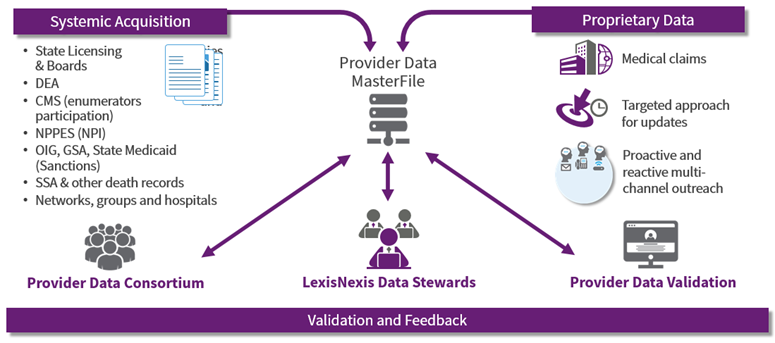The Advantages of Using a Cloud-Based Database Provider
The Advantages of Using a Cloud-Based Database Provider
Blog Article
Secret Features to Try To Find When Picking a Database Provider
Choosing a data source carrier is a critical decision that can considerably affect your organization's procedures and information administration technique. Among the crucial functions to think about are scalability alternatives, which guarantee that your system can adjust to expanding demands.
Scalability Options
When selecting a data source service provider, recognizing scalability options is essential to ensuring that the chosen solution can suit future development. Scalability describes the capability of a database system to expand its ability and efficiency in reaction to enhanced demand. There are 2 main types of scalability: vertical and straight.
Upright scalability, or "scaling up," entails improving a single web server's sources, such as CPU, RAM, or storage. This approach can be economical and straightforward for smaller sized applications however may get to a limitation where even more upgrades are also costly or impractical.
Straight scalability, or "scaling out," includes including a lot more servers to disperse the tons. This strategy enables greater adaptability and can fit substantial boosts in data quantity and user traffic (database provider). It is specifically useful for cloud-based data source options that can dynamically allocate sources based upon demand

Safety Steps
.gif)
When assessing safety and security steps, consider the implementation of encryption methods (database provider). Data-at-rest and data-in-transit security are important to make sure that sensitive information continues to be safeguarded, also in the event of a safety and security breach. In addition, try to find companies that provide solid verification mechanisms, such as multi-factor verification (MFA), to better improve accessibility control
Regular safety and security audits and compliance with market requirements, such as GDPR or HIPAA, are indicative of a carrier's commitment to information security. Furthermore, make inquiries concerning their event response strategy; a robust strategy can minimize the influence of any type of possible safety incident.
Efficiency Metrics
Evaluating efficiency metrics is important for companies to guarantee that their picked database carrier satisfies functional requirements. Secret performance metrics consist of response throughput, scalability, and time, which collectively figure out the performance of database operations under differing loads.
Reaction time is essential, as it reflects exactly how promptly the database can process inquiries and return outcomes. Organizations should try to find metrics that show average reaction times throughout optimal and off-peak hours. Throughput, frequently determined in purchases per second (TPS), offers understanding right into the data source's ability to handle high volumes of requests without efficiency destruction.
Scalability analyzes the database's capacity to grow with the company's requirements. A durable data source provider should demonstrate vertical and horizontal scaling abilities, enabling smooth adjustments as demands rise and fall. Furthermore, recognizing latency, specifically in dispersed systems, can aid companies examine the responsiveness of the data source throughout various geographical places.
Consumer Assistance
Trusted client support is a cornerstone of effective data source administration, offering organizations with the assistance required to solve problems and optimize performance. When picking a data source company, assessing the degree of client support they supply is necessary. A robust support group need to include numerous channels of communication, such as phone, e-mail, and live chat, making certain that individuals can access help whenever they require it.
Additionally, receptive support groups that are offered 24/7 greatly boost the dependability of the data source service. Motivate reaction times and reliable resolution of problems can dramatically minimize downtime and increase general performance. It is likewise useful to consider the schedule of devoted assistance personnel, who can supply tailored help based upon an organization's details needs.

Rates Framework
When thinking about a data source provider, the pricing framework is a pivotal variable that can substantially impact a company's spending plan and general approach. A transparent and adaptable pricing design is crucial for lining up the data source sets you back with company demands - database provider. Organizations should examine whether the rates is based on usage, per customer, or a flat rate, as each design can generate different monetary effects over time
It moved here is necessary to examine any additional expenses linked with the provider's services, such as data storage space costs, purchase costs, and support fees. Some carriers might offer tiered pricing, enabling scalability as the company expands, while others may enforce rigorous restrictions that could become costly as data demands enhance.
Additionally, companies need to take into consideration the lasting worth of the data source solution. While reduced first rates can be enticing, they might not make up future upgrades, upkeep costs, or assimilation prices. Performing a thorough cost-benefit evaluation will certainly aid recognize one of the most appropriate prices structure that balances support, performance, and scalability, inevitably making certain that the picked database company aligns with the organization's operational and financial purposes.
Conclusion
In verdict, selecting a database provider requires mindful consideration of different critical functions. Reviewing performance metrics about his allows the recognition of efficient databases, and easily accessible customer support improves the total user experience.
Selecting a database carrier is a crucial decision that can dramatically impact your organization's operations and information management technique.When choosing a data source carrier, understanding scalability options resource is important to making sure that the picked remedy can accommodate future growth. When selecting a database company, examining the degree of consumer assistance they use is crucial.When considering a database provider, the pricing structure is a pivotal factor that can significantly impact an organization's budget and overall strategy. Performing a thorough cost-benefit analysis will certainly aid recognize the most ideal prices structure that balances efficiency, scalability, and support, eventually guaranteeing that the selected data source carrier lines up with the organization's functional and monetary objectives.
Report this page